WEFT
The Olimpias WEFT action set, a social somatics, emerges from my own and my family's experiences working in textile factories. Most of us tend to be unaware of how fabrics are made: jersey, cotton, or the kind of synthetics that make up the clothes most of us wear. I wish to not just draw attention to this estranged relationship to an everyday material and its mode of production, but to actively intervene into it, by addressing participants' embodied relationship to their clothes, to the transnational practices that sustain their production, and to the scene of the factory. Let us investigate experiences that offer some space between cloth and skin. The actions aim to activate connections between sensuality, care and clothes - in particular when we check each other's labels, get involved with each other's bodily boundaries. Together, we place ourselves into different spatial registers of intimacy, near and far, local and global. We send thanks to the people who touched our garment before it touched our skin.
This is a participatory performance, with set actions, and a debriefing circle.
Publication about the Project: WEFT on Contemporary Theatre Review, ‘Occupy the WEFT: Choreographing Factory Affect and Community Performance.’ Contemporary Theatre Review. 25:3 (2015): 401-416.
Jill Magi: Textile, labor, buildings: Lesson plans for an 'evoked epigenetics.' On Spivak, Kuppers, and Kocik. Jacket2.
Scenes:
San Francisco Art Institute, December 2011
Making and Meanings of Queer Dance conference, February 2012, University of Michigan
Eco-Arts, Laney College, Oakland, CA, February 2012
Goddard College, Port Townsend, WA, March 2012
Disability Studies class, Melanie Yergeau, U of Michigan, April 2012
Emergent Communities in Contemporary Poetry, UC Santa Cruz, April 2012
Open Engagement, May 2012
Society for Disability Studies, Denver, June 2012
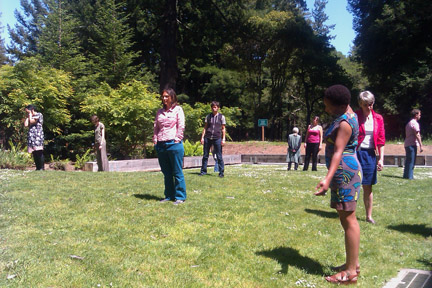
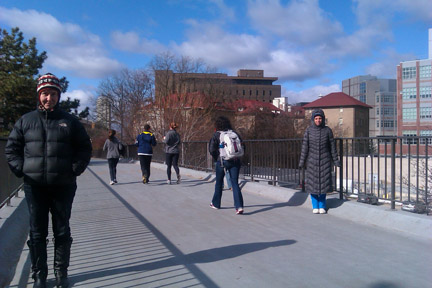
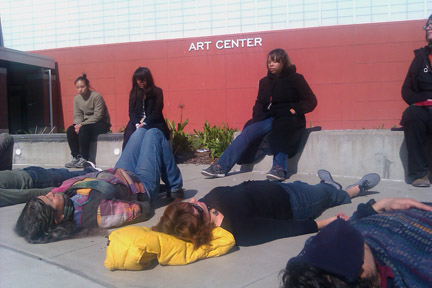
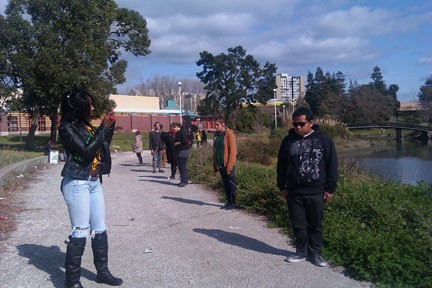
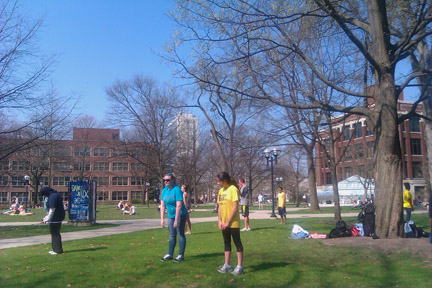
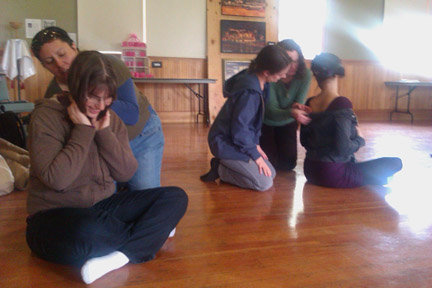
Participant Sharings:
-I felt my hands as if they were new
-the crickets were the motion: warp and weft: the shuttle moving: one cricket on my right, the other on my left
-looking at the flowers, blanket of soil, everything became fabric and I was in it
-everything in a weave
-others also aware
-I was not judged; honoring the workers without judgment means I decide to see you, workers of another hemisphere; no guilt for my choices, my own limited means; maybe change is possible
-precariousness: grip of my toes hanging on--economies--tipping points--a butterfly flies across this concern
(Jill Magi, April 2012)
Fabric
As I stood
On a Bridge
Halfway between
Here and There
I tried to face you
Somewhere else
In some “other’s” place,
On warm shores.
But the cold wind bit my face
And kept me anchored
Then the hood of my coat
Crept around the breeze
To caress my ear, for bayed
The cut of the air
And cosseted me
My tiny facial hairs
Raised against the ice wind
Lay back down
Calmed by soft Protection
Of fabric
And for a moment I was released from cold
Toward you
Wondering if it was the sweat of your
Warm shores, absorbed by fabric
Absorbed by flesh
That had whispered warmth in my ear.
Adesola Akinleye , March 15th 2012
back to The Olimipas